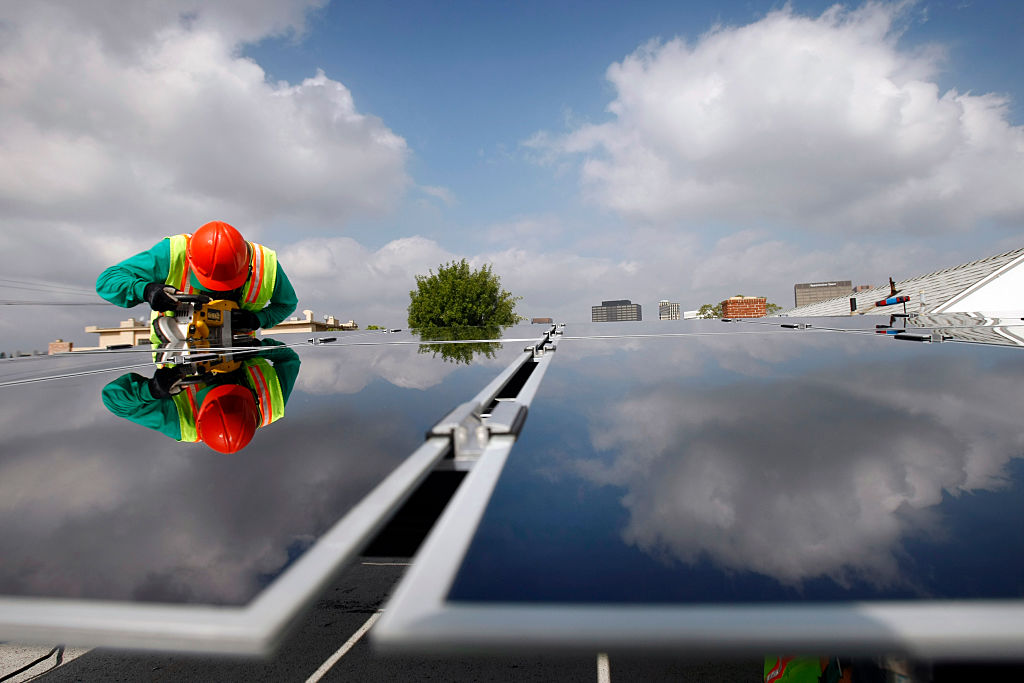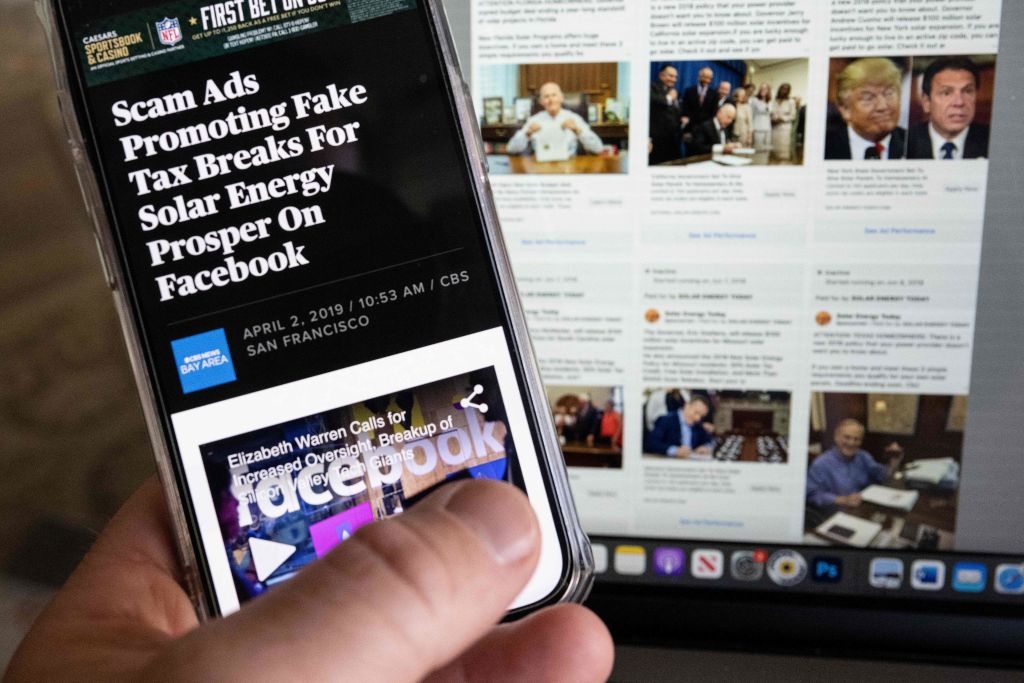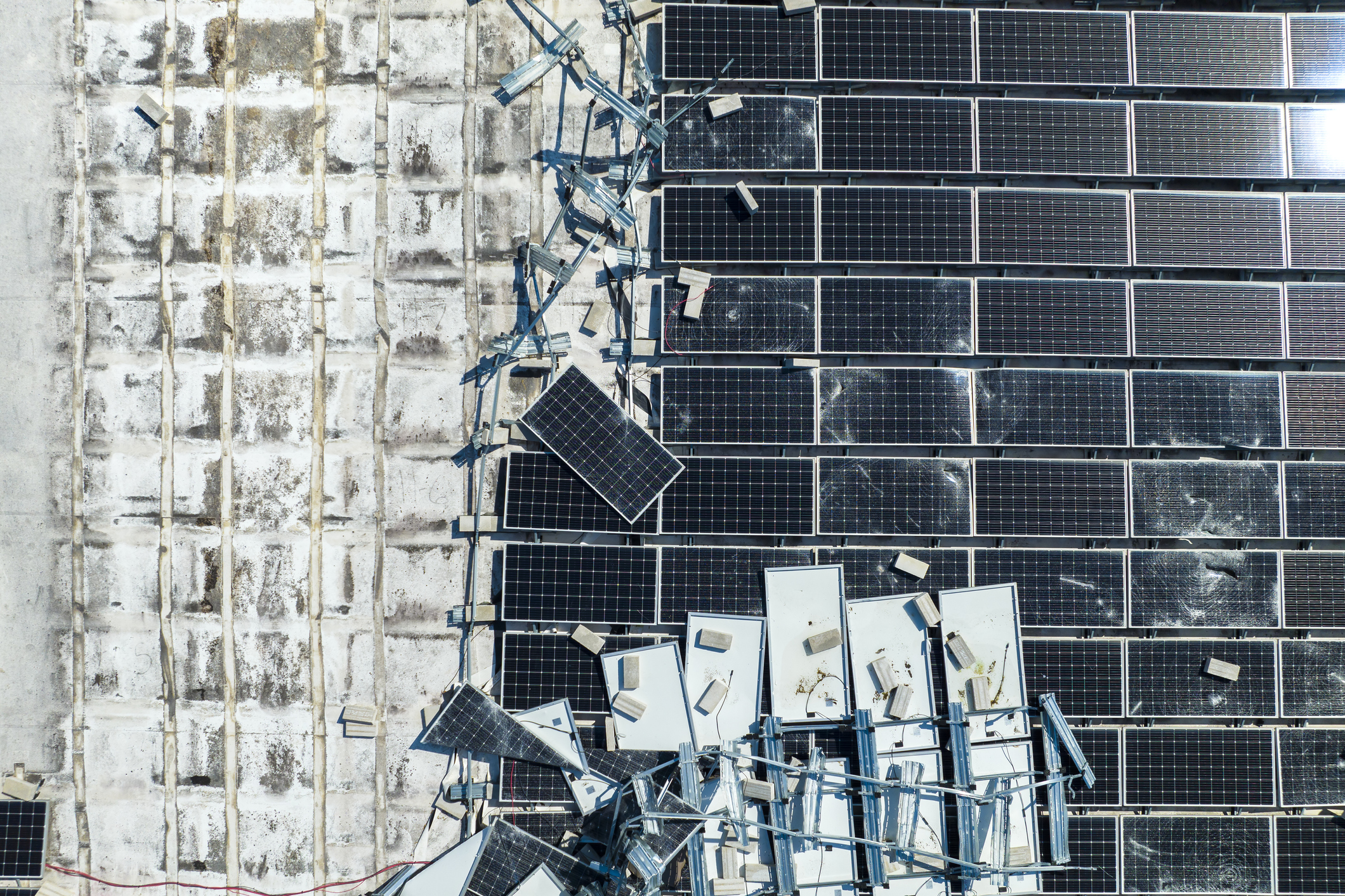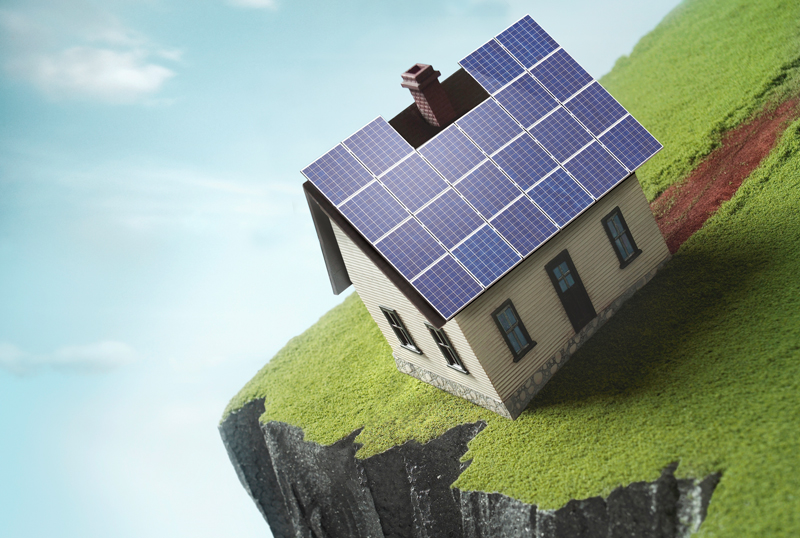A decade ago, someone knocking on your door to sell you solar panels would have been selling you solar panels. Now, they are probably selling you a financial product—likely a lease or a loan.
Mary Ann Jones, 83, didn’t realize this had happened to her until she received a call last year from GoodLeap, a financial technology company, saying she owed $52,564.28 for a solar panel loan that expires when she’s 106, and costs more than she originally paid for her house.
In 2022, she says, a door-to-door salesman from the company Solgen Construction showed up at her house on the outskirts of Fresno, Calif., pushing what he claimed was a government program affiliated with her utility to get her free solar panels. At one point, he had her touch his tablet device, she says, but he never said she was signing a contract with Solgen or a loan document with GoodLeap. Unbeknownst to Jones, the salesman used "yoursolarguyujosh@gmail.com" as her purported email address—that of course, was not her email address. She’s on a fixed income of $960 a month, and cannot afford the loan she says she was tricked into signing up for; she’s now fighting both Solgen and Goodleap in court.
Her case is not uncommon. Solar customers across the country say that salespeople obscure the specific terms of the financial agreements and cloud the value of the products they peddle. Related court cases are starting to pile up. “I have been practicing consumer law for over a decade, and I’ve never seen anything like what we are seeing in the solar industry right now,” says Kristin Kemnitzer, who represents Jones and says her firm gets “multiple” calls every week from potential clients with similar stories.
More From TIME
Angry customers aren’t the only reason the solar industry is in trouble. Some of the nation’s biggest public solar companies are struggling to stay afloat as questions arise over the viability of the financial products they sold to both consumers and investors to fund their growing operations.
These looming financial problems could topple the residential solar industry at a time when solar is supposed to be saving the world. Though solar represented just 3.4% of the nation’s electricity generation in 2022, studies show that rooftop solar could eventually meet residential electricity demand in many states if deployed widely, freeing American homes from dependency on fossil fuels. To help speed adoption, the Inflation Reduction Act extended a 30% tax credit for residential solar and battery installations.
Still, the residential solar industry is floundering. In late 2023 alone, more than 100 residential solar dealers and installers in the U.S. declared bankruptcy, according to Roth Capital Partners—six times the number in the previous three years combined. Roth expects at least 100 more to fail. The two largest companies in the industry, SunRun and Sunnova, both posted big losses in their most recent quarterly reports, and their shares are down 86% and 81% respectively from their peaks in January 2021. (This isn’t because of an economy-wide trend; the S&P 500 has grown 26% over the same time period.) Sunnova is also under the microscope for having received a $3 billion loan guarantee from the Department of Energy while facing numerous complaints about troubling sales practices that targeted low-income and elderly homeowners. Another solar giant, SunPower, saw shares plunge 41% on Dec. 18 after it said that it may not be able to continue to operate because of debt issues. Sunlight Financial, a big player in the solar finance space, filed for Chapter 11 bankruptcy in October; it also faces a lawsuit alleging that the company made false and misleading statements about its financial well-being.
At the root of these struggles is the complicated financial engineering that helped companies raise money but that some investors and analysts say was built on a framework of lies—or at least exaggerations.
Since at least 2016, big solar companies have used Wall Street money to fund their growth. This financialization raised the consumer cost of the panels and led companies to aggressively pursue sales to make the cost of borrowing Wall Street money worth it. National solar companies essentially became finance companies that happened to sell solar, engaging in calculations that may have been overly optimistic about how much money the solar leases and loans actually bring in.
“I’ve often heard solar finance and sales compared to the Wild West due to the creativity involved,” says Jamie Johnson, the founder of Energy Sense Finance, who has been studying the residential solar industry for a decade. “It’s the Silicon Valley mantra of ‘break things and let the regulators figure it out.’”
How financialization raised the cost of rooftop solar
Residential solar has always faced a big impediment to growth: installing and maintaining solar panels is expensive, and few consumers wanted to spend tens of thousands of dollars in cash to pay upfront for what was a relatively untested product. To get around this problem, a company called SolarCity came up with a new model in the early 2010s—leasing solar panels to customers, allowing them to pay little to no upfront cost. Companies like SunRun quickly followed; by 2014, this “third-party owned” kind of leased solar accounted for around 70% of total residential installations.
Besides enabling sales, there were other, even bigger, financial benefits of this practice for SolarCity. Since the company, not the consumer, owned the solar panels, SolarCity could claim the hefty 30% tax credit for solar panels the government approved in 2005. It then took those tax credits and sold them to companies like Google or Goldman Sachs who, unlike SolarCity, were making a profit and so owed money on their taxes. Those sales helped fund SolarCity’s further growth.

SolarCity’s other innovation was to package together thousands of consumer leases and sell them to investors as asset-backed securities, which enabled the company (and others that followed suit) to move debt off their balance sheet. Investors liked buying these asset-backed securities because they had higher rates of return than government bonds, and were perceived as relatively low risk—the assumption was that homeowners would make the monthly solar-lease payments to keep their electricity on. It didn’t hurt that these securities made investor portfolios look more climate-friendly. By 2017, the sale of solar asset-backed securities (ABS) by companies including SolarCity and SunRun had reached $1 billion.
However, these financial innovations also increased the pressure on companies to grow quickly. Solar companies needed lots of new customers in order to package the loans into ABS and sell them to investors. Public companies especially faced intense scrutiny from investors who expected double-digit quarterly growth. And with upfront costs no longer a barrier for new customers, solar companies began to see almost every homeowner as a target, and they deployed expensive sales teams to go out and sell as aggressively as they could.
“It is genuinely hard for these national businesses to maintain profitability—if you want to grow, you have to spend a lot of money on customer acquisition,” says Michelle Davis, head of global solar at Wood Mackenzie.
SolarCity ran out of money in 2016 and was acquired by Tesla, but the problems created by its expensive model have persisted. (Tesla did not respond to a request for comment.) Even today, about one-third of the upfront cost of a residential solar system goes to intermediaries like sales and financing people, says Pol Lezcano, an analyst with BloombergNEF. In Germany, where installation is done locally and there are fewer intermediaries, the typical residential system costs about 50% less than it costs in the U.S. “The upfront cost of these systems is stupidly high,” says Lezcano, making residential solar not “scalable.”
After growing 31% in 2021 and 40% in 2022, residential solar will only grow by 13% in 2023 and then contract 12% in 2024, according to predictions from the research firm Wood Mackenzie. In part, that’s due to higher interest rates than the industry has ever had to face. In addition, recent legislative changes in California reduce the amount of money that homes can earn from sending power back to the grid, making solar less appealing financially; other states are following California’s lead.
Residential solar representatives dispute the claim that the industry is in trouble; though installations will decline in 2024, the number of homes with rooftop solar will increase from 4 million today to 10 million by 2030, according to Stephanie Bosh, vice president of communications for the Solar Energy Industries Association.
High interest rates and policy changes might not be a huge problem if the big solar companies weren’t already burning through money and needing to take out even more debt—which is itself getting more expensive. In their most recent earnings reports, SunRun lost $1 billion in the last quarter, while Sunnova said that one risk to its future growth is its dependency on raising money from third-party investors. As Travis Hoium, who has been covering the solar industry for more than a decade for The Motley Fool, notes, “With all of these companies, you are on a financing treadmill—which is awesome until the treadmill stops.”
The lies that underpin consumer solar loans
Meanwhile, the pressure for fast sales may have led some companies to look the other way when salespeople obscured the terms of the solar panel leases and loans they were selling in order to close a deal. Consumer lawyers have made allegations about salespeople fudging consumer incomes on loan applications so they could qualify; telling them they’d get a tax refund for solar panels even if their income wasn’t high enough; and sending important documents to fake email addresses so consumers wouldn’t see them and protest.
Jesus Hernandez, 53, says a salesman from Southern Solar called him in 2019 with the pitch that installing solar panels could cut his monthly electric bill to as low as $50 a month; Hernandez was paying around $500 a month at the time. Hernandez, a housekeeping supervisor, couldn’t afford the up-front costs, but the salesman said GoodLeap would give him a loan. When the salesman later came to his house in Dallas to close the deal, he also promised that were Hernandez to get panels, the government would write him a solar-subsidy check for $16,000. Hernandez was sold; he agreed to take out a 20-year loan to install about $62,000 worth of solar panels.
After interests and fees, that $62,000 turned out to be more like $90,000. Today, Hernandez pays about $400 a month on the loan. Worse, his electric bill is still in the $500 range, because the panels do not produce the promised electricity. The company took out a lien on his house without his knowledge, he says, and it turns out that his 2019 income—around $50,000—meant that he wasn’t making enough money to qualify for the tax incentive upfront. He sued Southern Solar, and a jury awarded him $500,000 in November 2023 but he hasn’t seen a penny yet, he says. He tells anyone who asks that they shouldn’t buy solar panels, and if they do, that they should record the whole sales pitch in case the salesperson isn’t telling the truth. “Everything they told us was a lie,” he says. (In response to a request for comment, Southern Solar said it was filing an appeal and so would not answer questions at this time.)
Hernandez is one of a growing number of consumers now saying in courts and in arbitration that salesmen from solar-panel and solar-panel-finance companies—including some of the biggest in the U.S., like GoodLeap, Mosaic, Sunnova, and SunRun— tricked them into taking out onerous loans they didn’t want—or that someone signed them up for a loan without their knowledge. “The thing that blows my mind is the scale of the fraud,” says Robert Tscholl, who represents 46 clients currently in arbitration with GoodLeap over allegations that they were misled about the terms of their loans or that they were given faulty equipment. “Tens of thousands of people bought into this, thinking they were doing good.”

There is evidence that solar finance companies knew that not every sale is by-the-book. As early as 2017, an employee of Mosaic allegedly flagged to his superiors that salespeople were running credit inquiries in ways that violated federal and state privacy laws. “This is looking more and more like a systemic issue. It's already big, I'm trying to stop it from getting bigger,” the employee wrote in an email, according to court documents filed in a lawsuit alleging that door-to-door salesmen for Mosaic and Vivint Solar (now part of SunRun) submitted unauthorized credit applications for consumers who had no interest in getting solar panels. (The parties settled the case out of court.)
Even some people who voluntarily signed up for financing products say they were misled about the actual cost of the solar panels. That’s because loans from companies like GoodLeap and Mosaic often include an unexplained and significant “dealer fee.” For example, a customer buying a $30,000 solar panel system with a low interest rate may not know that price includes a $10,000 loan-dealer fee. In other words, the cost of the panels, had they paid cash, would have been just $20,000; the extra 30% is the price they paid for the low-interest loan, though many consumers allege this was not explained to them.
Convincing a customer to sign up for financing is lucrative for the companies, and some door-to-door solar salespeople have contracts that pay them extra every time they convince customers to sign up to finance a deal. “Every deal that we sell that’s financed, the lending company basically gives us a kickback,” said a recruiter on a public Zoom call in October trying to attract new salespeople to work for a company called TST Pros. That kickback is on top of an average of $7,000 commission per deal, the recruiter said. And of course, those costs get passed along to consumers, too.
Consumers don’t catch these extra costs in part because salespeople often present documents to potential customers on tablets or phones, making it easy to skip over the fine print, Connor says. Mary Ann Jones’ situation is not that unusual—homeowners are sometimes told that they’re tapping their finger on an iPad to get a quote from a loan company, but salesmen are in fact signing them up for a loan, says Kemnitzer, Jones’s lawyer. (Goodleap says that it is inaccurate for Jones to claim that the loan was fraudulently originated and that it has a video of her being walked through its terms, though it declined to share that video with TIME.)
“These finance companies are well aware that salesmen are taking advantage of electronic devices to hide documents from consumers,” says Andrew Milz, who has represented a number of solar-finance customers in cases filed against a range of companies including Mosaic.
Few of these solar cases have yet made it to court, in part because of the binding arbitration requirements in many of the loans and leases, but some recent developments make lawyers hopeful that their clients won’t have to pay these loans. For example, last November, after just two days of testimony, a jury awarded Jesus Hernandez half a million dollars. And a California judge denied GoodLeap’s legal motions to have Mary Ann Jones’ case resolved by arbitration, meaning it is on its way to court, though GoodLeap filed an appeal.
In some ways, the current situation in the residential solar market is analogous to the subprime lending crisis that set off the Great Recession, though on a smaller scale. Like in the subprime lending crisis, some companies issued loans to people who could not—or would not—pay them. Like in the subprime lending crisis, thousands of these loans—and in solar’s case, also leases—were packaged and sold to investors as asset-backed securities with promised rates of return. The Great Recession was driven largely by the fact that people stopped paying their loans, and the asset-backed securities didn’t deliver the promised rate of return to investors. Similar cracks may be forming in the solar ABS market. For instance, the rate of delinquencies of loans in one of Sunnova’s asset-backed securities was approaching 5% in the fall of last year, according to an October 2023 report issued by KBRA, a bond ratings agency. Historically, delinquencies in solar ABS had been around 1%.

The firms that grade these asset-backed securities have long said delinquencies would be low because rooftop-solar customers had high credit scores. The problem is that they appear not to have considered that even customers with good credit scores may not want to pay for solar panels that they were told would be free—or that salesmen could be signing people up without their knowledge. The appraisal and ratings firms tasked with vetting these financial instruments have failed before in the solar industry; in 2019, a group of investors sued both the auditor and the appraiser that had signed off on a company called DC Solar that turned out to be a billion-dollar Ponzi scheme.
“No ratings agency is actually going in and checking what actually happened at the time of signing, they’re just looking at the data put forth about these loans,” says Tom Domonoske, a consumer attorney who has filed cases against solar and financing companies.
So far, national regulators have not taken much action against solar panel installers or the companies that finance solar loans. There is one exception: in 2021, the Consumer Financial Protection Bureau required a financial company called GreenSky to refund or cancel $9 million in loans to thousands of customers who reported not authorizing them. GreenSky’s business model is similar to that of Mosaic and GoodLeap; salesmen show up at a potential customer’s door promising them home improvements, encouraging them to take out a loan at the tap of a few buttons.
If you ask the solar companies about these allegations, they’ll say that unhappy customers are a tiny percentage of their total portfolio. GoodLeap, for instance, says it has a good reputation with homeowners, and that it has more than 1 million customers but is currently named in just 95 lawsuits. It did not provide TIME with how many arbitration proceedings it is in with customers. Sunnova says it has a “zero tolerance” policy when it comes to salespeople who take advantage of vulnerable people, and investigates allegations that arise, terminating salespeople when necessary. Sunnova also emphasizes that each ABS has additional protections built in to protect investors from defaults, and that it has not had to use those protections. Mosaic did not respond to a request for comment.
Even if none of the consumer cases succeed in court, some Wall Street analysts say that solar companies’ questionable accounting around the long-term value of the systems they sell could come back to haunt them if regulators take action. For a solar company to get a tax credit for the panels it leases to customers, it has to tell the IRS how much it thinks the leases are worth, based on projected future costs and revenues. As early as 2016, a researcher at MIT’s Energy Initiative estimated that such companies were overstating this value by as much as 50%. Recently, Muddy Waters, a Wall Street firm, issued a research report accusing SunRun of “bamboozling” the IRS by inflating the value of its tax credits.
SunRun itself has disclosed in investor filings that it is in the midst of an IRS audit. One Wall Street analyst, Gordon Johnson, alleges that SunRun has claimed $40 billion in tax subsidies it didn’t deserve, and calls this “the biggest tax fraud in the history of the U.S.” (SunRun says that the independent appraisers who estimate the values of SunRun systems do so consistent with industry best practices, and investors and lenders have “closely diligenced” its tax and valuation procedures.)
Still, if the IRS finds that SunRun and other solar companies manipulated tax returns, it could lead to significant financial problems in the industry. “The real risk is that the cash flows are not there,” says Johnson, whose equity research firm, GLJ Research, has issued reports alleging that the asset-backed securities of companies like SunRun and Sunnova are akin to a Ponzi scheme. “Mark my words, many of these companies are going to be bankrupt.”
The future of residential solar
The broad problems facing residential solar and financing companies are already causing some pain in the forms of layoffs—California alone lost 17,000 solar jobs in 2023, according to the California Solar and Storage Association. There are ripple effects in the industry; Enphase Energy, which makes microinverters for solar panels, said in December it was laying off 10% of its workforce amidst softening demand.
It could get a lot worse before it gets better, with not just lost jobs, but near-total collapse of the current system. Some analysts, like Lezcano of BloombergNEF, think that the big, national players are going to have to fall apart for residential solar to become affordable in the U.S., and that in the future, the solar industry in the U.S. will look more like it does in Germany, where installations are done locally and there’s fewer door-to-door sales.
Other analysts think the solar industry will rebound after a few tough years. They are not worried about alleged fraud—if there were so many unhappy customers out there, says Davis, the Wood Mackenzie analyst, the industry would be taking action. Besides, so many customers are required to enter into arbitration before suing in court that it could take a long time for any big repercussions.
Over the past few years, a handful of people got rich off of Americans who were told they could simultaneously save money and save the planet. For example, Hayes Barnard, GoodLeap’s founder and chairman, was named by Forbes as one of the 400 richest people in the world in 2023. The idea that we need to convince tens of thousands of Americans who can’t afford it to put solar on their rooftops shifts the responsibility for addressing the climate crisis from the entities who could really make a difference—big companies and governments, for example—and onto individuals who are good targets for financing companies.
But despite the fact that there are many consumers like Mary Ann Jones, who are deep in debt and saddled with solar panels they don’t want, the rooftop solar sales offensive continues. Just a few weeks ago, another salesperson knocked on Jesus Hernandez’s door and tried to sell him on rooftop solar. Hernandez’s son answered the door and told the salesman that the family already had 68 non-working panels on the roof and that they were in the process of suing the installer. The salesman retreated, going to knock on other doors on the block.
More Must-Reads from TIME
- Caitlin Clark Is TIME's 2024 Athlete of the Year
- Where Trump 2.0 Will Differ From 1.0
- Is Intermittent Fasting Good or Bad for You?
- The 100 Must-Read Books of 2024
- Column: If Optimism Feels Ridiculous Now, Try Hope
- The Future of Climate Action Is Trade Policy
- FX’s Say Nothing Is the Must-Watch Political Thriller of 2024
- Merle Bombardieri Is Helping People Make the Baby Decision
Contact us at letters@time.com
